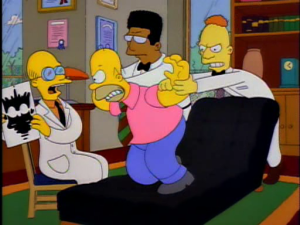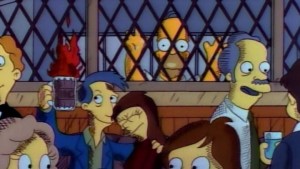It’s been over twenty years since I can remember the first time I saw Matt Groening’s “crudely drawn” family of five deal with the almost surreal problems that life seemingly presents on a daily basis. From that moment I laid my eyes on “The Simpsons” I became enamored and, eventually, a life-long fan (more than likely I’ll be re-watching episodes when I’m old enough to shout at clouds). During my time as a “Simpsons” viewer I’ve discovered many relatable life lessons that I plan to share with you. Welcome to “The Simpsons Life Lesson” series (season three).
A Man Wearing Pink Means He’s Crazy (Episode 1: “Stark Raving Dad”)
It seemed like another frantic morning for Homer Simpson during the season’s premiere episode. Scrambling around to find one of his seemingly endless supply of white shirts, Homer discovered that the only clean coverings had turned pink thanks to Bart putting his “lucky red hat” in the laundry. Homer, scared over this revelation, explained to his wife that he couldn’t wear a pink shirt to work due to his lack of popularity amongst his fellow white shirt wearers. With no other choice and lacking time, Homer entered the nuclear power plant all pinked out. Almost immediately Homer’s boss, Mr. Burns, noticed the man dressed in pink – calling him out as a potential, “…free-thinking anarchist.”
Mr. Burns, under the suggestion of therapist Marvin Monroe, gave Homer a take-home personality test to find out how crazy Homer really was. After allowing his son to fill out the form, Homer was institutionalized in a local loony bin alongside the real mentally unstable. Homer would eventually prove his sanity, but it came at the price of his reputation, pride and almost his job (for that week, anyway). So unless you’re popular enough to buck the system, don’t. You could end up in an insane asylum scared about being attacked by a Michael Jackson impersonator.
One Person Can Change Things (Episode 2: “Mr. Lisa Goes to Washington”; Episode 3: “When Flanders Failed”)
In the season’s second episode, Homer became obsessed with “Reading Digest” magazine and the various quizzes and articles found throughout its pages. With Homer’s discovery of this magazine came the revelation of an essay contest where the winners would get a chance to read their essay in Washington D.C. for a potential cash prize. Lisa, inspired by a bald eagle, found the right words to send her family on a trip east (or north, or maybe even south depending on where you think Springfield is located). But what should’ve been a marvelous time turned into a moment for Lisa that almost crushed her belief in the democratic system when she witnessed her state’s congressman being bribed to cut down Springfield Forest.
Lisa rewrote her essay (now titled “Cesspool on the Potomac”) to reveal how her beloved government had become corrupted with greed. Hearing Lisa’s words set off a chain of events that eventually reached the U.S. President himself. Finding out her congressman was arrested quickly for his actions, Lisa’s faith in her government was restored.
One episode later, Lisa’s father found himself with a great opportunity: the chance to wish for something. During Ned Flanders’ barbeque, the do-diddling neighborino announced his quitting the pharmaceutical game to start his own shop focusing on the needs of left-handed intervals such as himself. Given the chance to break a wishbone between himself and Flanders, Homer won and wished for his neighbor’s store to fail. And who would’ve guessed it – the wish came true and the poor Flanders family was stuck living in their car. Homer, feeling terribly and reasonably responsible for not only wishing for this new reality, but also didn’t alert potential customers about the store when they needed it the most, called in a few favors, contacted known left-handed Springfieldians and turned Ned’s business around completely.
If you ever believe one person can’t help turn a wrong into a right, look no further than at the actions of Homer and Lisa Simpson.
People Will Steal Your Ideas (Episode 10: “Flaming Moe’s”)
You see, Homer and his sister-in-laws don’t particularly get along; and the long-winded slideshow get-togethers don’t make things better between the three. One night, while drudging through the muck of photos featuring hairy legs and monotone voices, Homer decided to get a beer. Homer quickly discovered his favorite beverage was unavailable. Rather than suck it up and return to his perpetual boredom, the family’s patriarch went on a quest to create the best alcoholic drink ever. By mixing a slew of liquors and, inadvertently, cough syrup and fire, Homer discovered something he would dub, “A ‘Flaming Homer’.” Homer would eventually show local bartender Moe how to make this drink.
When a random barfly asked the name of this newfound liquid refreshment, Moe took it upon himself to answer, “It’s called a ‘Flaming Moe’!” Homer watched from that moment on as Moe took credit for his concoction, turning his rundown pub into a hotspot nightclub featuring such guests as The Rolling Stones. Eventually Homer himself would kill the hype behind his stolen creation, but the loss of his idea pained him more than destroying it (featuring a “Phantom of the Opera”-like scene in the process).
If you have an idea that could potentially make you a ton of money, turn you into a local celebrity and/or be invited to sing with one of the greatest bands of all time, don’t tell anyone what that idea is until you profited from said idea (especially don’t tell someone as scummy as a suicidal bartender who captures whales from Seaworld).












